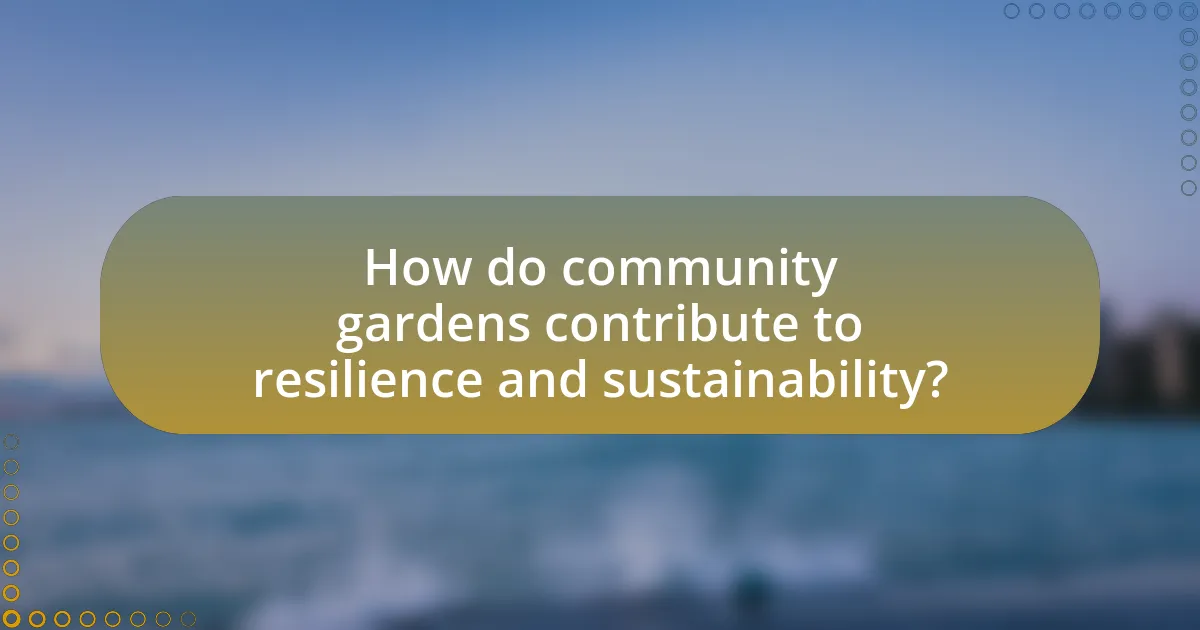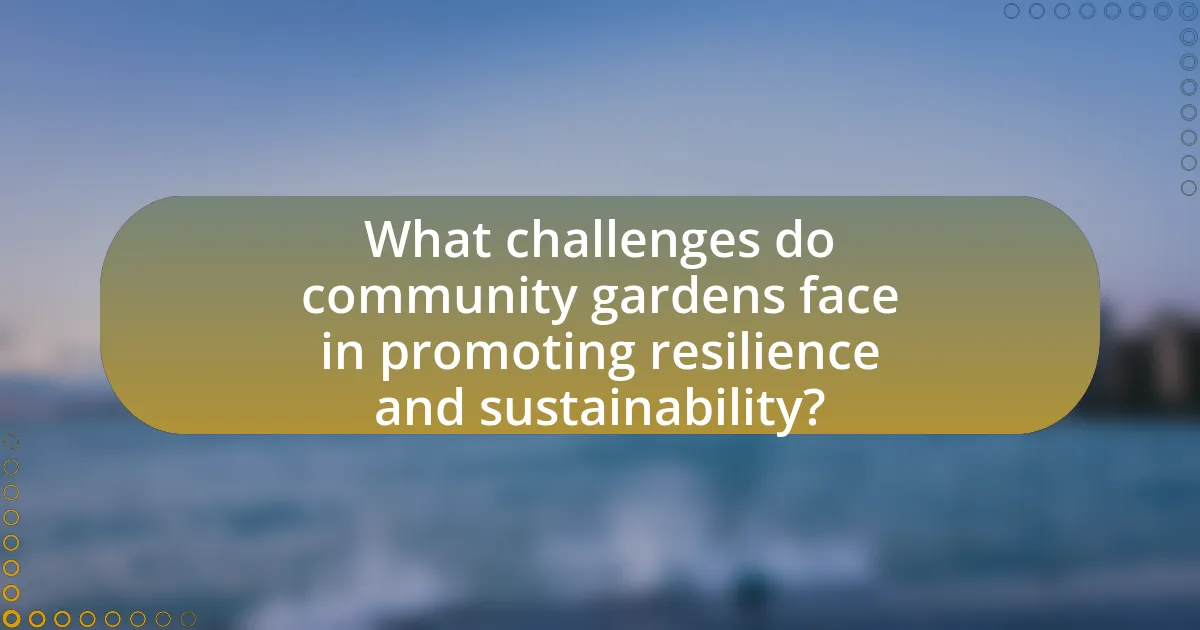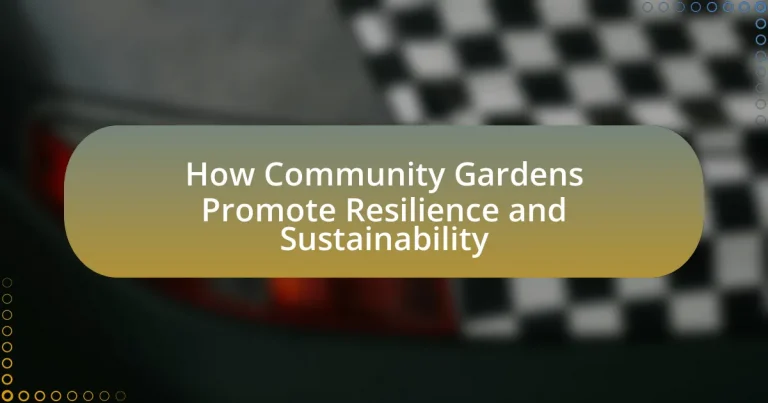Community gardens are vital for promoting resilience and sustainability within urban environments. They enhance local food security by providing fresh produce, particularly in food deserts, while fostering biodiversity and community engagement. Key principles of resilience in these gardens include diversity, sustainability, and adaptability, which collectively support ecosystem stability and public health. Community gardens also face challenges such as resource limitations and social dynamics, but effective management strategies, educational initiatives, and partnerships can significantly enhance their impact. This article explores the multifaceted role of community gardens in building resilient communities and sustainable urban ecosystems.

How do community gardens contribute to resilience and sustainability?
Community gardens contribute to resilience and sustainability by enhancing local food security, fostering biodiversity, and promoting community engagement. These gardens provide fresh produce, reducing reliance on external food sources and minimizing carbon footprints associated with transportation. Research indicates that urban agriculture, including community gardens, can increase access to nutritious food, particularly in food deserts, thereby improving public health outcomes. Additionally, community gardens support biodiversity by creating habitats for various species, which can enhance ecosystem stability. Furthermore, they encourage social cohesion and community involvement, leading to stronger networks that can better respond to environmental challenges. Studies show that neighborhoods with community gardens often exhibit increased resilience to climate change impacts, as these spaces can mitigate urban heat and manage stormwater effectively.
What are the key principles of resilience in community gardens?
The key principles of resilience in community gardens include diversity, community engagement, sustainability, and adaptability. Diversity in plant species and gardening practices enhances ecosystem stability and productivity, allowing gardens to withstand pests and diseases. Community engagement fosters social connections and shared responsibility, which strengthens the support network essential for overcoming challenges. Sustainability practices, such as composting and water conservation, ensure long-term viability and resource efficiency. Adaptability allows gardens to respond to changing environmental conditions and community needs, ensuring their relevance and functionality over time. These principles collectively contribute to the resilience of community gardens, enabling them to thrive in the face of adversity.
How do community gardens enhance local food security?
Community gardens enhance local food security by providing accessible sources of fresh produce to urban populations. These gardens increase the availability of nutritious food, particularly in food deserts where access to grocery stores is limited. Research indicates that community gardens can produce significant quantities of food; for example, a study published in the Journal of Agriculture, Food Systems, and Community Development found that community gardens can yield up to 1,000 pounds of produce per year on a quarter-acre plot. This increased food production directly contributes to local food systems, reduces reliance on external food sources, and fosters community engagement in sustainable practices.
What role do community gardens play in fostering social connections?
Community gardens play a crucial role in fostering social connections by providing a shared space for individuals to collaborate, interact, and build relationships. These gardens serve as communal hubs where diverse community members come together to cultivate plants, share gardening knowledge, and participate in social events, thereby enhancing community cohesion. Research indicates that participation in community gardening can lead to increased social interaction and a sense of belonging, as evidenced by a study published in the Journal of Community Psychology, which found that community gardens significantly improve social ties among residents.
Why is sustainability important in community gardening?
Sustainability is important in community gardening because it ensures the long-term viability of the garden while promoting environmental health. Sustainable practices, such as organic farming and water conservation, help maintain soil fertility and reduce pollution, which are essential for producing healthy food. Research indicates that community gardens employing sustainable methods can increase biodiversity, enhance local ecosystems, and improve community resilience against climate change impacts. For instance, a study published in the Journal of Environmental Management found that sustainable community gardens significantly contribute to urban greening and food security, demonstrating their critical role in fostering sustainable urban environments.
How do community gardens promote biodiversity?
Community gardens promote biodiversity by creating diverse habitats that support various plant and animal species. These gardens often incorporate a wide range of native plants, which attract pollinators such as bees and butterflies, essential for ecosystem health. Research indicates that urban areas with community gardens can increase local species richness by providing green spaces that serve as refuges for wildlife. For instance, a study published in the journal “Urban Ecology” found that community gardens can host up to 50% more species compared to conventional urban landscapes, demonstrating their role in enhancing urban biodiversity.
What sustainable practices are commonly used in community gardens?
Sustainable practices commonly used in community gardens include organic gardening, composting, water conservation, and biodiversity promotion. Organic gardening eliminates synthetic pesticides and fertilizers, fostering healthier soil and plants. Composting recycles organic waste, enriching soil fertility and reducing landfill contributions. Water conservation techniques, such as rainwater harvesting and drip irrigation, minimize water usage while maintaining plant health. Additionally, promoting biodiversity through companion planting and native species enhances ecosystem resilience and pest control. These practices collectively contribute to environmental sustainability and community well-being.

What challenges do community gardens face in promoting resilience and sustainability?
Community gardens face several challenges in promoting resilience and sustainability, including limited access to resources, inconsistent community engagement, and environmental factors. Limited access to resources, such as funding and quality soil, hampers the ability of these gardens to thrive and sustain long-term operations. Inconsistent community engagement can lead to fluctuating participation levels, which affects the garden’s productivity and social cohesion. Environmental factors, such as climate change and urban development, pose additional threats by altering growing conditions and reducing available space for gardening. These challenges collectively hinder the effectiveness of community gardens in fostering resilience and sustainability within their communities.
How do environmental factors impact community gardens?
Environmental factors significantly impact community gardens by influencing plant growth, biodiversity, and soil health. For instance, sunlight availability affects photosynthesis, which is crucial for plant development; gardens with optimal sunlight can yield more produce. Additionally, soil quality, including pH levels and nutrient content, directly determines the types of plants that can thrive, as healthy soil supports diverse flora. Water availability is another critical factor; gardens in areas with adequate rainfall or irrigation systems tend to be more productive. Research indicates that community gardens in urban areas with poor air quality may struggle due to pollution affecting plant health. Thus, environmental factors play a vital role in the success and sustainability of community gardens.
What are the effects of climate change on community gardening?
Climate change negatively impacts community gardening by altering growing conditions, increasing pest populations, and affecting water availability. Rising temperatures can lead to heat stress on plants, while unpredictable weather patterns, such as droughts and heavy rainfall, disrupt planting schedules and crop yields. Additionally, climate change can enhance the prevalence of pests and diseases, making it more challenging for community gardeners to maintain healthy plants. A study published in the journal “Agriculture, Ecosystems & Environment” highlights that climate variability can reduce the productivity of urban gardens, emphasizing the need for adaptive strategies to sustain community gardening efforts in the face of these challenges.
How can community gardens adapt to urban development pressures?
Community gardens can adapt to urban development pressures by implementing flexible land-use strategies and forming partnerships with local governments and developers. These gardens can negotiate land leases that allow for temporary use of urban spaces, ensuring their continuity even amidst development. For instance, cities like San Francisco have adopted policies that protect community gardens from being displaced by new construction, demonstrating the effectiveness of legal frameworks in safeguarding these green spaces. Additionally, community gardens can diversify their functions by incorporating educational programs and local food production, which can enhance their value to the community and make them more resilient against urban pressures.
What social challenges do community gardens encounter?
Community gardens encounter several social challenges, including conflicts among participants, issues of access and equity, and the need for ongoing community engagement. Conflicts can arise due to differing visions for the garden’s use, management styles, or interpersonal disagreements among gardeners. Access and equity issues often manifest when certain community members face barriers to participation, such as socioeconomic status, language differences, or lack of transportation. Additionally, sustaining community engagement is crucial; gardens require active participation and support from local residents to thrive, which can be difficult to maintain over time. These challenges can hinder the effectiveness of community gardens in promoting resilience and sustainability within neighborhoods.
How do community dynamics influence the success of a garden?
Community dynamics significantly influence the success of a garden by fostering collaboration, resource sharing, and social cohesion among participants. When community members actively engage in decision-making and share responsibilities, they create a sense of ownership and commitment to the garden’s maintenance and productivity. Research indicates that gardens with strong community involvement often yield higher crop outputs and better overall health of plants, as seen in studies conducted by the American Community Gardening Association, which highlight the correlation between community engagement and garden success rates. Additionally, social interactions within the garden can lead to increased knowledge exchange about gardening techniques, pest management, and sustainable practices, further enhancing the garden’s productivity and resilience.
What strategies can be employed to overcome community engagement barriers?
To overcome community engagement barriers, strategies such as fostering inclusive communication, building trust through consistent outreach, and providing accessible resources can be employed. Inclusive communication ensures that diverse community voices are heard and valued, which can enhance participation. Building trust through consistent outreach, such as regular meetings and transparent decision-making, encourages community members to engage actively. Providing accessible resources, including educational workshops and materials in multiple languages, helps to remove obstacles that may prevent participation. Research indicates that communities with strong engagement strategies see increased participation rates, leading to more successful community garden initiatives, which in turn promote resilience and sustainability.

How can community gardens be effectively managed for long-term success?
Community gardens can be effectively managed for long-term success by establishing clear governance structures, fostering community engagement, and implementing sustainable practices. Clear governance structures, such as forming a garden committee, help in decision-making and conflict resolution, ensuring that all voices are heard. Community engagement through regular meetings and events strengthens relationships among members, promoting a sense of ownership and responsibility. Sustainable practices, including crop rotation, organic gardening, and water conservation techniques, enhance soil health and resource efficiency, contributing to the garden’s longevity. Research indicates that community gardens with strong governance and active participation have higher rates of sustainability and resilience, as evidenced by studies conducted by the American Community Gardening Association, which highlight the importance of community involvement in maintaining garden vitality.
What best practices should be followed in community garden management?
Effective community garden management requires clear organization, active community involvement, and sustainable practices. Establishing a governance structure, such as a committee, ensures that decisions reflect the community’s needs and fosters accountability. Engaging community members through regular meetings and volunteer days enhances participation and ownership, which are crucial for long-term success. Implementing sustainable gardening practices, such as organic gardening and water conservation techniques, not only promotes environmental health but also educates participants about sustainability. Research indicates that community gardens can increase local biodiversity and improve food security, demonstrating their role in promoting resilience and sustainability within communities.
How can community members be encouraged to participate actively?
Community members can be encouraged to participate actively by creating inclusive and engaging opportunities that highlight the benefits of involvement. For instance, organizing workshops and events that focus on gardening skills, sustainability practices, and community building fosters a sense of ownership and belonging. Research indicates that community gardens can increase social interaction and improve mental well-being, which motivates individuals to engage more actively. A study published in the Journal of Community Psychology found that participation in community gardens leads to enhanced social networks and increased civic engagement, demonstrating the effectiveness of such initiatives in promoting active participation.
What role does education play in the sustainability of community gardens?
Education plays a crucial role in the sustainability of community gardens by equipping participants with essential knowledge and skills for effective gardening practices. This knowledge fosters a sense of stewardship and responsibility among community members, leading to better management of resources and increased biodiversity. Research indicates that educational programs in community gardens enhance participants’ understanding of sustainable agriculture techniques, such as composting and organic pest management, which are vital for long-term garden health. Furthermore, studies show that communities with educational initiatives experience higher levels of engagement and retention, contributing to the overall success and longevity of these gardens.
What resources are available for community garden initiatives?
Community garden initiatives can access various resources, including funding opportunities, educational materials, and local partnerships. Organizations such as the American Community Gardening Association provide grants and technical assistance to support garden projects. Additionally, local governments often offer land access and resources through urban agriculture programs. Research indicates that community gardens can enhance food security and foster community engagement, as highlighted in studies by the University of California, which found that community gardens significantly increase access to fresh produce and strengthen social ties among residents.
How can funding and grants support community gardening efforts?
Funding and grants can significantly support community gardening efforts by providing essential financial resources for project initiation, maintenance, and expansion. These financial aids enable communities to purchase seeds, tools, and materials necessary for gardening, as well as cover costs for educational programs that teach gardening skills. For instance, the USDA Community Food Projects Competitive Grant Program has allocated millions of dollars to support community-based food projects, demonstrating the impact of funding on enhancing local food systems and promoting sustainability. Additionally, grants often encourage collaboration among community members, fostering a sense of ownership and responsibility, which further strengthens community ties and resilience.
What partnerships can enhance the impact of community gardens?
Partnerships with local governments, non-profit organizations, educational institutions, and businesses can significantly enhance the impact of community gardens. Local governments can provide land access, funding, and resources for infrastructure development, while non-profit organizations can offer expertise in community engagement and sustainability practices. Educational institutions can facilitate workshops and research initiatives that promote gardening skills and environmental awareness. Additionally, businesses can contribute through sponsorships, donations, or volunteer support, fostering a sense of community and shared responsibility. These collaborations create a network of support that strengthens the garden’s role in promoting resilience and sustainability within the community.
What practical tips can help ensure the success of community gardens?
To ensure the success of community gardens, it is essential to establish clear goals and involve the community in the planning process. Engaging local residents fosters ownership and commitment, which are critical for sustainability. Research indicates that community involvement leads to higher participation rates and better maintenance of garden spaces. Additionally, selecting appropriate plants for the local climate and soil conditions enhances growth and yields, as evidenced by studies showing that native plants often thrive better in their natural environments. Regular workshops and educational programs can also empower community members with gardening skills, further contributing to the garden’s success.


